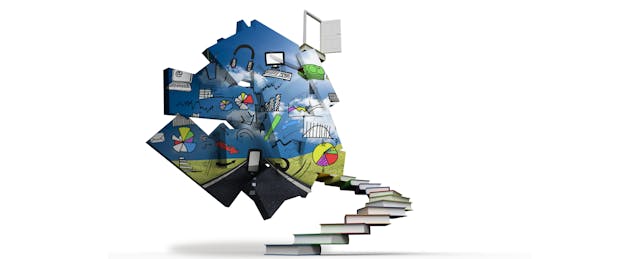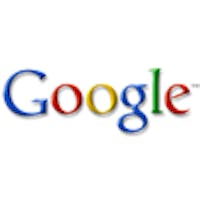Coding and computer science are typically associated with outcomes around problem-solving and analytical skills. For instruction that yields cultural literacy, we most often look to language arts and social sciences. But Victor Hicks approaches these academic pathways as complementary, not contradictory. With Google's Applied Digital Skills as his foundation, Hicks prioritizes culturally relevant teaching through the vehicle of computer science.
Hicks teaches grades three through eight at The Kindezi School at Old Fourth Ward in Atlanta and also directs the nonprofit Coding With Culture. He has made it his life’s mission and work to bring learning technology to more students—particularly students of color. As part of our celebration of Black History Month, EdSurge spoke to Hicks about his culturally relevant approach to closing the digital divide.
EdSurge: As an educator, what are your thoughts on Black History Month?
Hicks: It’s important and relevant—and not just for African-American students. It’s about modeling to all students that everyone deserves a seat at the table. We really need to make everyone’s culture part of the conversation.
Black History Month provides an opportunity to show all students that we have lots of commonalities. Alone, it’s not going to fix everything. However, it’s an entry point to get the right discussions started.
I was excited to hear about the Black History Month lessons in Applied Digital Skills. When they were released, I was pleased to see the immense variety of experiences offered and the relevancy of the digital skills that students would learn in addition to meaningful exposure to moments in Black history and culture.
Celebrate Black History, Culture, and Identity with Applied Digital Skills lessons.
What sort of challenges do teachers face when incorporating Black history and culturally relevant content into the curriculum? How do you overcome them?
It’s always a matter of time to some degree. For many teachers, especially those in core subjects, the focus is often on standards and testing. Standards are good for guidance, but they can be paralyzing if they become a checklist. As an electives teacher, I can reach out to the core subject teachers and support them in this effort.
This is where collaboration and project-based learning are vital. Students can get exposure to cultural literacy, while also being elbow deep in the content and standards. The magic of teaching plays such an important part. Content creators will produce things for teachers that can be generic. My duty is to make it personal and relevant for my students.
How does Applied Digital Skills help you achieve your goals as a teacher focused on culturally relevant instruction?
Ultimately, it’s about closing the gap for all students. Students of all backgrounds need to function and succeed in the digital, global community. Google dedicated themselves to creating a curriculum that uses different applications and helps students gain different skill sets. They did their job, and I need to do my job as a facilitator in order to maximize the learning.
The tools are great, but with teacher creativity, we can really take this to the next level. Teachers can add the cultural piece when they choose from options in order to learn the skills and produce the product. I love that Applied Digital Skills can be incorporated into so many subjects and core courses.
There are subtle things that Google has done that are significant as well. For example, the featured videos have incorporated people of color, so my students are seeing themselves doing this work. And the lessons in the Black History Month series will help me increase the amount of Black culture and history in my classroom by taking the task of actually teaching the digital skills off of my plate. Now, I am able to focus my energy and time on creating content without sacrificing the learning of digital skills expected of my students.
Tell us about a favorite lesson that has helped you bring culturally relevant content into your classroom.
My students do a project where they select a Historically Black College or University (HBCU) to research and then produce virtual tours, maps and online guides using the “Create a Presentation” lesson. We use a project-based learning approach where my students have to research the city and the community and produce a guide that becomes an adventure piece—a historical fiction example. They choose what they want to create and then what resources will support that. They meet all the tasks and skills but in a larger, portfolio-based approach.
In addition to teaching computer science at my school, I run camps for students to learn coding and digital literacy skills connected to the history and culture of HBCUs. Many of the lessons, including "Create a Virtual Family Reunion" and "Build a Logo" will be great additions to my HBCU focused curriculum used with students of all ages. I really enjoy the fact the lessons are structured enough to assess students' understanding of the digital skills introduced but flexible enough to allow for tweaks and edits that a creative-thinking educator can appreciate!
Which aspect of your instruction has the greatest impact upon your students?
It’s all about their agency. I’m teaching under the umbrella of computer science, and coding is the core skill. But for me, it’s an imperative that students learn what excellence is and that they have the capacity to be excellent. Most of my learners will not become computer programmers or scientists, but they will have the confidence to tackle any problem or pursuit. The ultimate outcome is perseverance.
Yes, they learn coding, animation, video, digital design and communication. But the biggest skills are the sense of self, self-worth and motivation. I want them to think that, despite anything, they can do amazing things. They learn to see themselves as an important part of the world; they have a place in their own future.
What advice do you have for teachers who are skeptical of bringing technology into the classroom?
Applied Digital Skills is a great entry point. It saved my life as a technology teacher. It gave me the agency as a teacher to say, “I can do this,” and add this to my lessons. Google is a great bridge. Don’t be afraid to use Applied Digital Skills verbatim.
My work has evolved after gradually trying things beyond the scripted curriculum. If you’re looking for ways to introduce a culturally relevant curriculum, Applied Digital Skills is perfect. It’s great for a beginner but also allows freedom as one advances and wants to stretch, too.



